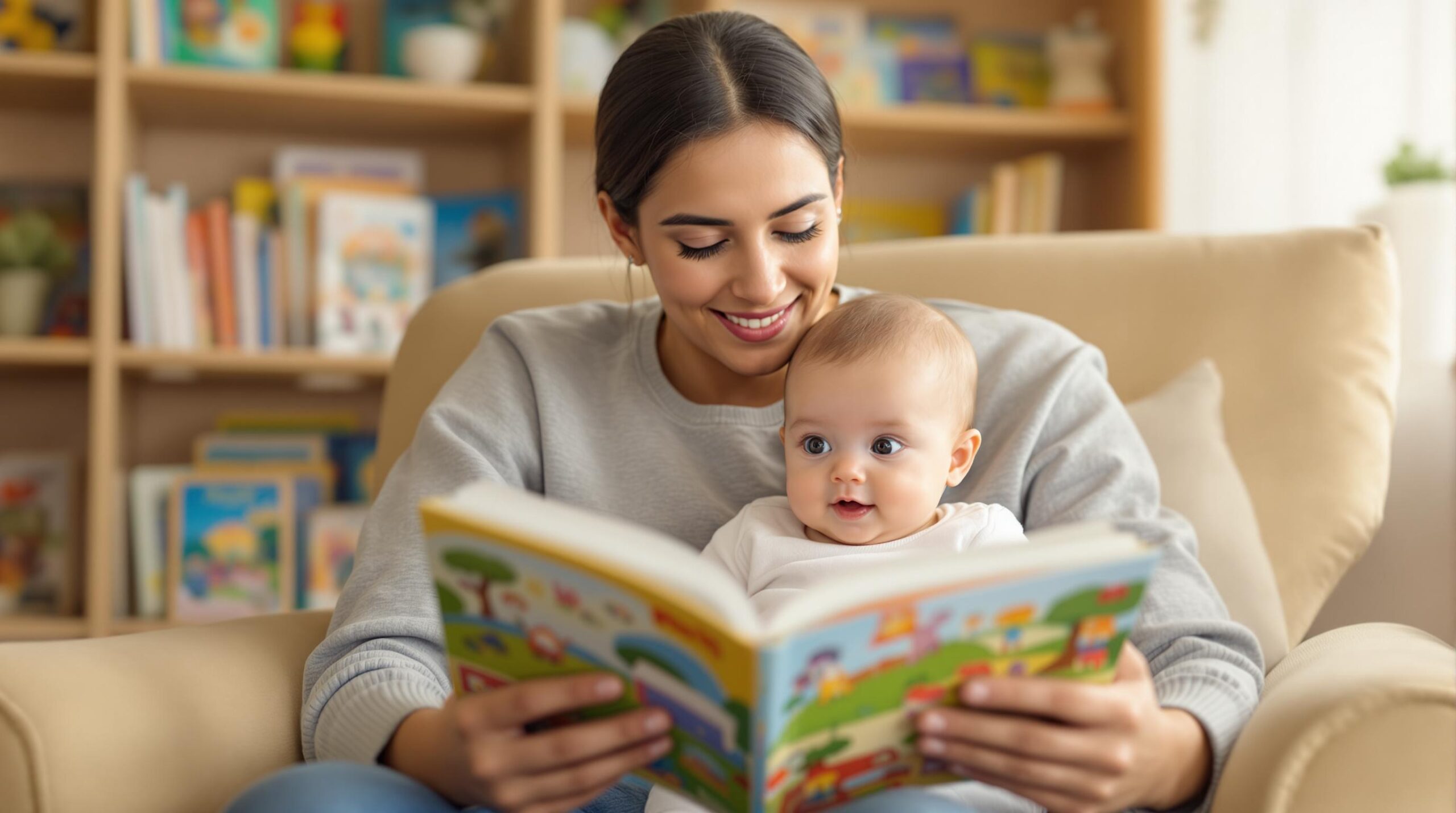Table of Contents
ToggleAs a parent, one of the most impactful things you can do for your baby’s development is to read to them regularly. This simple act can have profound effects on your child’s cognitive, language, and social-emotional growth. Let’s explore why reading to your baby is so crucial for early learning and how you can make the most of this precious time together.
The Power of Reading: Nurturing Your Baby’s Development
Reading to your baby is more than just a cozy bedtime ritual. It’s a powerful tool that enhances early learning and development in multiple ways. When you open a book with your little one, you’re opening a world of possibilities for their growing mind.
Cognitive development gets a significant boost from regular reading sessions. As you flip through colorful pages and point out pictures, your baby’s brain is hard at work, forming new neural connections. This process helps lay the foundation for critical thinking skills that will serve them well throughout their life.
Language skills blossom when babies are exposed to a rich vocabulary through books. Even if your little one can’t speak yet, they’re absorbing the sounds, rhythms, and patterns of language. This early exposure can give them a head start in communication skills.
The emotional benefits of reading together shouldn’t be overlooked. The close physical contact and shared attention create a strong bond between parent and child. This nurturing environment supports your baby’s emotional intelligence and helps them feel secure and loved.

Boosting Cognitive Skills Through Storytelling
Storytelling is a powerful tool for cognitive development. As you read to your baby, you’re helping them develop crucial mental skills that will serve as building blocks for future learning.
Object Permanence
Around 8 months old, babies start to understand that objects continue to exist even when they can’t see them. This concept, known as object permanence, is reinforced through books with flaps or hidden objects. By lifting flaps or turning pages to reveal hidden characters, you’re helping your baby grasp this important cognitive milestone.
Symbolic Thought
As your child approaches their second birthday, they’ll begin to develop symbolic thought – the ability to use one thing to represent another. Picture books are perfect for fostering this skill. When you point to a picture of a dog and say “dog,” you’re helping your child understand that the image represents a real animal.
Piaget’s Preoperational Stage
From ages 2 to 7, children enter what developmental psychologist Jean Piaget called the preoperational stage. During this time, children’s thinking becomes more symbolic, and they start to use language and mental imagery more effectively. Reading a variety of books can support this stage by exposing children to different concepts and scenarios, encouraging them to think beyond their immediate experiences.
Language Development: Words Come to Life
Books are a treasure trove of language for your growing baby. Each story introduces new words, phrases, and sentence structures, boosting infant brain development in remarkable ways.
Vocabulary Expansion
The more words your baby hears, the larger their vocabulary will likely be when they start speaking. Books often contain words that might not come up in everyday conversation, giving your child a richer linguistic foundation. For example, a story about a farm might introduce words like “tractor,” “harvest,” or “silo” – terms your urban baby might not encounter otherwise.
First Words and Beyond
Between 8 and 14 months, most babies say their first recognizable word. Regular reading can accelerate this process by familiarizing babies with the sounds and meanings of words. As you read, point to pictures and clearly enunciate words to help your baby make connections between sounds and objects.
Encouraging Communication
Reading aloud stimulates your baby’s desire to communicate. You might notice increased babbling or attempts to imitate sounds as you read. Encourage these efforts by pausing and giving your baby a chance to “respond” during the story. This back-and-forth interaction lays the groundwork for future conversations.
Emotional Intelligence and Social Skills
Stories are not just about words and pictures; they’re about feelings and relationships too. Reading to your baby can significantly contribute to their emotional and social development.
Understanding Emotions
Books often depict characters experiencing various emotions. As you read, you can help your baby understand these feelings by pointing them out and explaining them. “Look, the little boy is smiling. He’s happy because he found his lost toy!” This kind of narration helps babies start to recognize and name emotions.
Building Empathy
As your child grows, stories can help them develop empathy by allowing them to see situations from different perspectives. When you read about characters facing challenges or making choices, you’re giving your child opportunities to consider how others might feel.
Managing Separation Anxiety
Many children’s books address common childhood fears and anxieties. Reading stories about characters who successfully navigate separation from parents can help ease your child’s own separation anxiety. It shows them that it’s normal to feel nervous about being apart, but also that parents always come back.
Educational Benefits: Fun Meets Learning
Reading to your baby is an enjoyable way to introduce a wide range of subjects and concepts. It’s teaching toddlers new skills without them even realizing they’re learning!
Subject Introduction
Books can introduce your baby to an array of topics:
– Colors and shapes: Point out different shapes and colors in the illustrations.
– Numbers and counting: Count objects on the page together.
– Animals: Make animal sounds as you encounter different creatures in the story.
– Social skills: Discuss characters’ actions and their consequences.
Academic Preparation
Early exposure to books sets the stage for future academic success. Children who are read to regularly often enter school with larger vocabularies, better listening skills, and a greater interest in reading. This head start can have lasting effects throughout their education.
Edutainment
The combination of education and entertainment in children’s books makes learning fun and engaging. Interactive books with textures to feel, flaps to lift, or buttons to press add an element of play to the reading experience, keeping your baby interested and involved.
Parental Involvement: A Key to Success
Your active participation in reading time can significantly enhance your baby’s learning experience. It’s not just about reading the words on the page; it’s about creating an interactive and engaging environment.
Interactive Reading Techniques
Try these strategies to make reading time more interactive:
– Point to pictures and name objects
– Ask questions about what’s happening in the story
– Encourage your baby to touch the book or turn pages
– Use different voices for different characters
– Relate the story to your baby’s experiences
Anticipating Developmental Stages
As you read regularly with your child, you’ll become more attuned to their developmental progress. You might notice when they start recognizing certain words or showing interest in particular types of stories. This awareness can help you choose books that align with their current stage and interests.
Creating a Reading Routine
Establishing a consistent reading routine can provide structure and predictability for your baby. It might be part of your bedtime ritual or a special after-lunch activity. Whatever time you choose, try to make it a regular part of your day.
Developmental Milestones: Reading as a Support System
Reading to your baby supports various developmental milestones across different sectors of growth. It’s a holistic activity that touches on multiple aspects of your child’s development.
Gross Motor Skills
While reading might seem like a sedentary activity, it can support gross motor development too. Encourage your baby to sit up during story time, or let them crawl to choose a book. As they grow, they might stand or dance along with more active stories.
Fine Motor Skills
Handling books helps develop fine motor skills. Let your baby turn pages, lift flaps, or press buttons in interactive books. These actions help strengthen the small muscles in their hands and improve hand-eye coordination.
Cognitive Milestones
Reading supports cognitive milestones such as:
– Recognizing familiar objects and people (around 3 months)
– Understanding object permanence (around 8 months)
– Following simple directions (around 1 year)
– Beginning of symbolic thought (around 2 years)
Early Detection of Developmental Delays
Regular reading sessions provide opportunities to observe your child’s development closely. If you notice that your child isn’t reaching expected milestones, it might be worth discussing with your pediatrician. Early intervention can be crucial for addressing any potential developmental delays.
Quality Child Care: Reading Beyond the Home
The benefits of reading extend beyond your home. If your child attends daycare or preschool, ensure that reading is a part of their daily activities there too.
Choosing a Reading-Rich Environment
When selecting a child care provider, look for one that prioritizes reading. Ask about their daily schedule and how often they read to the children. A quality provider should have a well-stocked book corner and regular story times.
Consistency Between Home and Care Settings
Try to create consistency between home and care settings. Share your child’s favorite books with their care provider, and ask about books they enjoy at daycare so you can read them at home too. This continuity can reinforce learning and make your child feel more secure.
Long-Term Benefits of Quality Care
Research shows that high-quality child care, which includes regular reading activities, is associated with better cognitive, language, and social skills in children. These benefits can persist into the school years and beyond, highlighting the importance of a literacy-rich environment both at home and in care settings.
Remember, it’s never too early to start reading to your baby. Whether it’s a cloth book for your newborn or a picture book for your toddler, every reading session is an investment in your child’s future. So, grab a book, snuggle up with your little one, and embark on the wonderful journey of reading together. Your baby’s developing brain will thank you!
Sources:
Developmental Milestones
NICHD Study of Early Child Care and Youth Development
Website and Communication Standards: Plain Language
Program for the International Assessment of Adult Competencies (PIAAC)
National Institute of Child Health and Human Development (NICHD)
American Academy of Pediatrics (AAP) – Early Literacy











